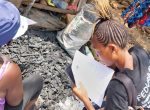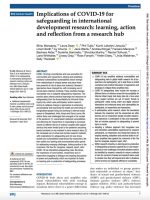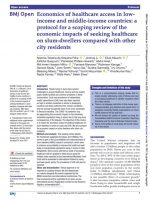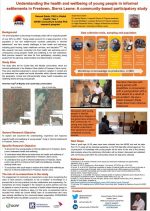In May 2023 a health and wellbeing survey of informal settlement residents in Cockle Bay, Moyiba and Dwazark, in Freetown, Sierra Leone was undertaken by ARISE partners. This blog acts as a summary, highlighting some of the main findings. We also have the full survey report available for download. Background This survey builds on the […]
Filmed in Freetown, Sierra Leone, the documentary looks at the realities of life for people living in informal settlements. It also explores ARISE’s community based participatory research approach, undertaken in partnership with communities to claim their rights to health, and address issues of health and political accountability to put people at the heart of decision […]
To celebrate the 125th anniversary of Liverpool School of Tropical Medicine, artist Luke Jerram is working in Freetown, Sierra Leone in collaboration with ARISE. Helping to empower local communities, we worked with local teams to install 21 solar powered LED streetlights within the informal settlements of Freetown. We installed the permanent lighting in public areas including water collection areas, […]
This brief outlines the work of the ARISE project and is a mini introduction to how we work in Kenya, Bangladesh, Sierra Leone and India as well as providing a snap shot of some of the ways in which we have made a difference. Read the brief if you want to understand the consortium structure […]
In this week’s episode we will be discussing the intersections between research and activism for social change. With our guests Vinodkumar Rao and Joseph Kimani, we will be seeking to understand how lessons from activist approaches can be applied within research and vice versa. We will also explore how power, participation and social justice fits […]
In this week’s episode we are talking to Inviolata Njoroge from LVCT Kenya and Shrutika Murthy from The George Institute for Global Health (TGI), India. They have shared their experiences of using visual methods and storytelling to bridge the power-laden distances between lived realities of waste pickers, child headed households, the elderly and people with […]
Abstract COVID-19 brings uncertainties and new precarities for communities and researchers, altering and amplifying relational vulnerabilities (vulnerabilities which emerge from relationships of unequal power and place those less powerful at risk of abuse and violence). Research approaches have changed too, with increasing use of remote data collection methods. These multiple changes necessitate new or adapted […]
View the article on page 21 of Lead 4 Magazine, here Recently, the world’s attention has been focused on the 26th UN Climate Change Conference of the Parties (COP26) in Glasgow. While much of the discussion at the event focussed on the future including emissions and projections, the conference also highlighted that for many, climate […]
[pdf-embedder url=”http://www.ariseconsortium.org/wp-content/uploads/2021/08/Teixeira-et-al-2021-Economics-of-health-care-provision-slum-dwellers-protocol-2.pdf” title=”Teixeira et al 2021 Economics of health care provision slum dwellers protocol (2)”] People living in slums face several challenges to access healthcare. Scarce and low-quality public health facilities are common problems in these communities. Costs and prevalence of catastrophic health expenditures (CHE) have also been reported as high in studies conducted in […]
The world population is becoming increasingly urban with an expected growth of over 60% by 2050. Young people account for a large proportion of the population in low and middle-income countries particularly in informal settlements, and face several challenges to their health and well-being, including good housing, basic healthcare services, and education. Yet, little research […]









